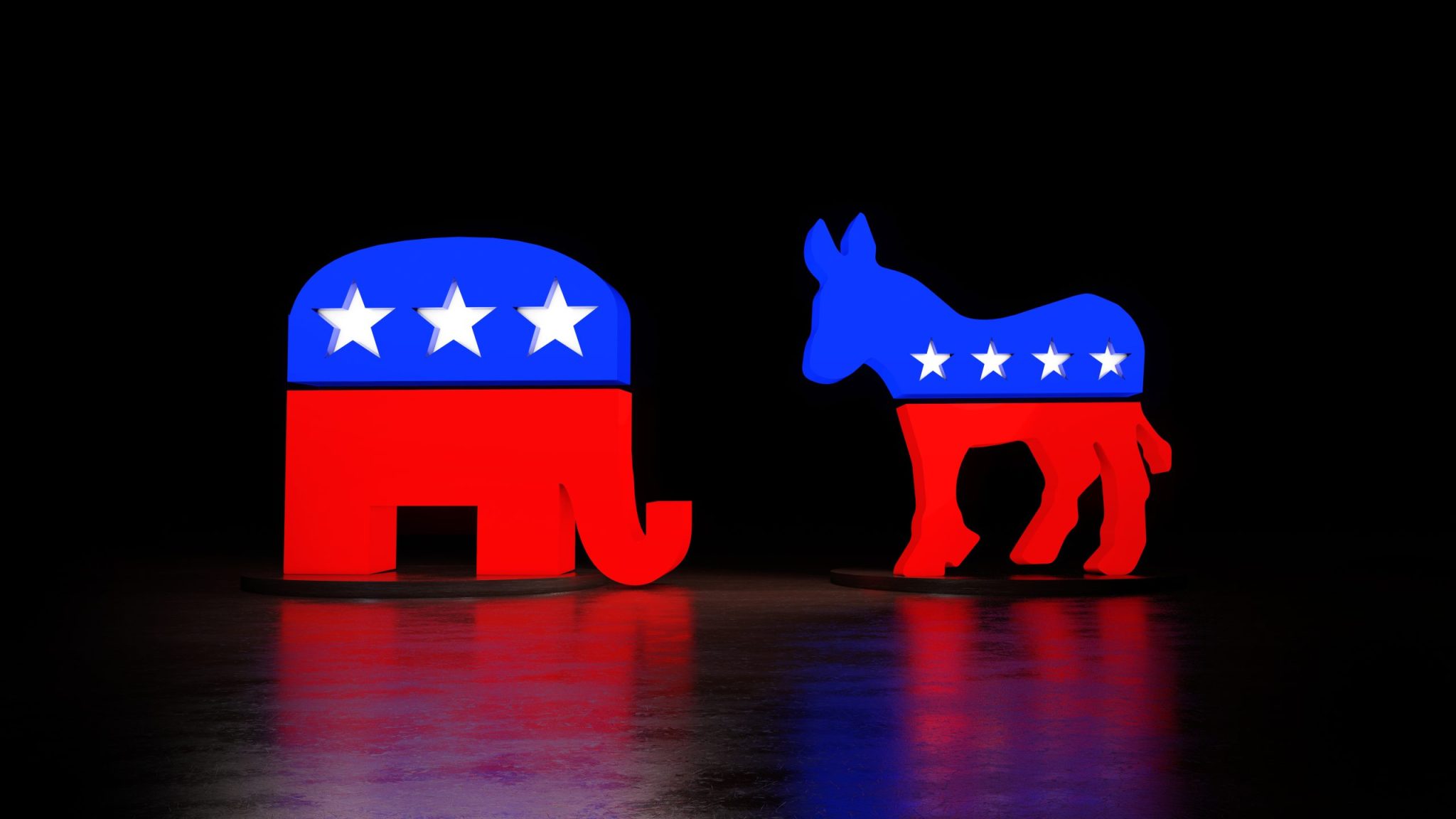In the polarized political landscape of the United States, few words carry as much weight or evoke as much passion as “democracy”. As the cornerstone of American political identity, democracy is both revered and contested by citizens across the ideological spectrum. This is particularly evident in the context of the 2024 US elections, where democracy is regularly presented as being “on the ballot”, and perceived threats to democracy are, at least in some races, central campaign issues.
Republican and Democratic candidates, however, discuss democracy in starkly different terms that reflect broader partisan divides. To conduct an analysis of how democracy and, more specifically, threats to democracy, are being framed, discussed, and politicized by candidates from both major parties in the lead-up to the November elections, we collected data from social media accounts associated with Republican and Democratic House, Senate, and presidential candidates confirmed to be on the 2024 general election ballot. We then analyzed all available posts made by those accounts on X, Facebook, Instagram, TikTok, YouTube, Rumble, Truth Social, Gettr, and Telegram between June 1 and September 30, 2024.
Drawing from this data, we found:
- Both Democratic and Republican candidates were far more likely to mention the other party, its policies, and its candidates rather than external threats, including foreign adversaries, as the main threats to democracy. In posts mentioning “threat” and “democracy”, Republicans mentioned domestic threats 85% of the time, with President Joe Biden, Vice President Kamala Harris, and/or Democrats specifically mentioned in 46% of posts. (This did not include posts where Republicans responded to or criticized Democrats for calling them “threats to democracy”, which accounted for an additional 23% of posts.) Russia, Iran, the People’s Republic of China (PRC), and other foreign threats were only mentioned in 8% of posts. Similarly, Democrats mentioned domestic threats in 89% of posts mentioning threats to democracy, with Republicans and/or former President Donald Trump specifically mentioned in 57% of relevant posts. The United States’ principal foreign adversaries and their leaders were only mentioned in 8.5% of posts.
- Democratic and Republican candidates frame threats to democracy in starkly different terms, starting with how often they mention “democracy” and variations of the phrase “threat to democracy”. Despite publishing 41% fewer posts than Republican candidates during the studied period, Democratic candidates made roughly three times more posts about threats to or the need to protect democracy compared to their Republican counterparts.
- Republican candidates, however, were far more likely than Democratic ones to speak about threats to the Republic or perceived efforts to “destroy America” or “destroy our country”. This suggests that the differences in how each party talks about the stakes of the election have more to do with semantics than partisan perceptions of the threat level.
- Besides overarching claims about the risks of the other party and its candidates, Democratic candidates primarily focused on threats to democratic norms, judicial independence, reproductive rights, and the policies advanced by the Heritage Foundation’s Project 2025. Republican candidates, meanwhile, were more reactionary in their messaging, often directly countering Democrats’ allegations to suggest that the “true threat” to democracy are Democratic policies, particularly around issues such as immigration, election security, and individual rights.
- Unsurprisingly, key events during the studied period—from the assassination attempts against Trump to Biden’s decision to drop out of the presidential race—served as flashpoints for conversations about democracy and threats to democracy. While some events sparked conversations about democracy from both parties, others, like the anniversary of the Voting Rights Act, were more partisan.
Methodology & Data Collection
Using open-source methods and publicly available datasets, we identified and verified social media accounts affiliated with US House, Senate, and presidential candidates from both major political parties running for election or reelection in November.1 (Sitting senators not up for reelection in 2024 were not included.) Those accounts were grouped by social media platform and party and imported into Junkipedia, a non-profit social media analysis platform. We then collected all posts from candidates that met our criteria for inclusion across X, Facebook, Instagram, Telegram, TikTok, YouTube, Rumble, Gettr, Telegram, and Truth Social, resulting in a total of 374,693 posts (155,453 from Democrats and 219,240 from Republicans). Identical posts posted on multiple platforms were not deduplicated.
From this corpus, we searched for posts that included the words “threat” and “democracy”, as well as other related terms and phrases noted in Table 1. We then conducted an analysis of how, how often, and when Republican and Democratic candidates discussed specific threats to democracy. This included manual coding of every post from candidates mentioning “threat” and “democracy” in the same post to categorize the perceived threats according to each party.
Accounts connected to candidates were only included after they secured their respective party’s nomination, meaning that posts made by candidates running in states that conducted their primaries during or after our studied period may not have been included or data from those candidates may be limited. In some cases, we were able to backfill posts made by candidates during the studied period after they won their primaries; however, this was only possible if data from those candidates was previously collected on Junkipedia. In cases where candidates were not previously tracked by Junkipedia, we were only able to collect data from the point at which we added those candidates’ accounts to our candidate lists. All of Harris’ posts were included in our study and Biden’s were not, even though Biden was the presumptive nominee for the first month of our studied period.
We analyzed posts from every social media platform available on Junkipedia, so candidates who are not on or who infrequently use those platforms may be excluded or underrepresented. In addition, we could only analyze text on video-based platforms such as Rumble, YouTube, and TikTok, meaning that some videos relevant to a given query may not have been identified if the accompanying text did not contain the queried word or words. Finally, while Junkipedia’s social media data collection is excellent, it is possible that some posts were missed, especially during the time period after Meta shut down Crowdtangle. However, given that we were interested in trends and only highlighting individual posts to illustrate those trends, we expect the impact of such exclusions to be limited.
The Semantic Divide
Differences in how each party discusses democracy begin with how often they use the term. During our three-month study period, Democrats mentioned democracy in approximately 2.9% of their posts (4,566 mentions in 155,453 posts) compared to 0.6% of posts for Republicans (1,314 mentions in 219,240 posts). While Republicans made slightly more posts mentioning the words “threat” and “democracy” (312 posts for Republican compared to 239 posts for Democrats), Democrats made far more posts (2,165 posts for Democrats compared to 761 posts for Republicans) that used other combinations of words to suggest that US democracy is either under threat or needs to be defended or saved. (Given our queried key terms, some of those posts were not relevant—for example, posts mentioning threats to non-US democracies—and others may have been double or even triple-counted. For example, posts that used the word “democracy” along with “threat”, “attack”, and “save” were counted three separate times.)
Though the word democracy has no perfect synonym, republic was occasionally used in place of democracy, particularly by Republicans. Republicans used republic three times as often as Democrats and were nine times more likely to post about threats to or the need to save “the Republic”. Republicans were also far more likely to use the terms “destroy our country” or “destroy America”, with Republican candidates using those terms in 227 posts compared to just 11 posts from Democratic candidates. This perhaps reflects a linguistic preference from the top of the ticket—accounts affiliated with Trump were responsible for 41 posts about efforts to destroy “our country” or “destroy America”.
The disparities in term usage reflect the differing ideological frameworks and political priorities of each party. Democrats focused on threats to democracy to emphasize the defense of democratic norms and institutions, especially considering perceived threats from so-called MAGA Republicans, Donald Trump, and Project 2025. This aligns with their broader election narratives, such as safeguarding rights like voting and women’s health, seen by Democratic candidates as under attack. In contrast, Republican candidates focused on threats to the Republic or the need to defend against those who seek to “destroy our country”, reflecting a traditionalist view of government as a protector of traditional values, liberty, and sovereignty, which similarly is aligned with Republican campaign talking points around gender, censorship, and government overreach.
The Narrative Divide
When discussing threats to democracy, Democratic and Republican candidates largely focused on different policy issues, though they were aligned in their belief that the other party posed the biggest threat. Among collected posts mentioning “democracy”, Republican candidates mentioned Harris, Biden, or Democrats in 662 unique posts (meaning posts referencing one, two, or all three of those terms were only counted once), or roughly 50% of all Republicans’ democracy-related posts. (Posts mentioning other Democrats—for example, Nancy Pelosi—but not Biden, Harris, or the word “Democrat”, were not counted, meaning the total number of posts mentioning Democrats was likely far higher.) In posts that referenced “threats” and “democracy”, Republican candidates framed the president, vice president, and/or Democrats as the threat in 46% of those posts, with another 23% of posts refuting Democrats’ claims that individual or collective Republicans are threats to democracy.
Democratic candidates mentioned Trump or Republicans in 896 unique posts mentioning democracy, or roughly 20% of their democracy posts. In posts that referenced “threat” and “democracy”, Democrats mentioned the former president or his party in 57% of those posts. Only 3% of Democratic candidates’ posts rebutted a Republican claim that individual or collective Democrats are a threat to democracy.
Both Republican and Democratic candidates also mentioned the other party, its policies, and its candidates far more often than foreign threats when discussing threats to democracy. In posts mentioning the word democracy, Republicans mentioned Russia, Iran, the PRC, one of those countries’ respective leaders, or simply “foreign” in 104 posts—though at least five of those posts downplayed the threat to democracy posed by Russia. When we coded posts that mentioned both “threat” and “democracy”, we again found that only 8% of those posts mentioned foreign threats. (Posts could be coded as both foreign and domestic if they referenced, for example, the other party creating or enabling a foreign threat.)
In posts mentioning democracy, Democratic candidates made roughly 40% more posts (161 total posts) than Republican candidates mentioning Russia, Iran, the PRC, one of those countries’ respective leaders, or simply “foreign” threats in general, though that still represented only about 3% of Democrats’ democracy-related posts. When we coded all Democratic candidates’ posts mentioning “threat” and “democracy”, we found that 8.5% of those posts mentioned foreign threats—a nearly identical percentage as Republican posts about threats to democracy.
Democratic candidates’ most frequent and consistent narrative concerning threats to democracy was an urgent, if often vague, call to action to defend US democracy, which they presented as being under siege by Trump, MAGA Republicans, and “radical” policy proposals, most notably those advanced by Project 2025. Democrats therefore positioned themselves as defenders of democratic values norms, and rights, likely to mobilize voters by linking democracy’s survival to key issues like voting rights, abortion, economic justice, and the perceived existential threat to democracy posed by Trump.
Conversely, Republican candidates focused on countering these claims, portraying Democrats’ rhetoric as hypocritical and politically motivated. Several Republican candidates took direct issue with Democrats’ alleged overuse of democracy as a campaign issue, as evidenced by several candidates who used quotes when referring to “threats to democracy”, thus suggesting that they were adopting Democrats’ language. Republican candidates also emphasized concerns about election integrity, immigration, and perceived abuses of power by Democratic leaders to counter Democratic allegations and to present themselves as the true protectors of democracy.
Threats to Democracy According to Democrats
Donald Trump
Unsurprisingly, Trump was the most mentioned entity in posts referencing threats to or the need to save democracy. Trump was mentioned in roughly 45% of Democratic candidates’ posts mentioning “threat” and “democracy” and 46% of posts mentioning “undermine” and “democracy”. Unlike Biden and Harris, whom Republicans commonly referred to as interchangeable parts and representative of the entire Democratic party, Trump was frequently mentioned as a unique and distinct threat. This messaging came from the top of the ticket, with Harris posting on Instagram that Trump is a “threat to our democracy and fundamental freedoms”. (This post was made in July when Harris was then the presumptive vice-presidential nominee.)
Representative Robert Garcia (D-Calif.) compared Trump and his “authoritarian dictator friends” to “Lex Luther and his Legion of Doom”. Similarly, Phil Ehr, the Democratic candidate for Florida’s 28th congressional district, compared comments made by Trump to those made by Venezuelan strongman Nicolas Maduro. And Paul Tonko (D-N.Y.) referred to Trump and his “MAGA allies” as “existential threats to democracy”.

Figure 1: Instagram post from Kamala Harris on July 3, 2024
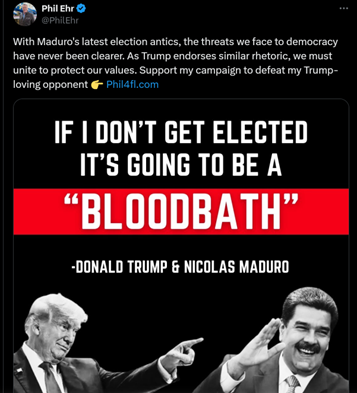
Figure 2: Tweet from Florida Democratic House candidate Phil Ehr on July 29, 2024
Project 2025
Project 2025 was a significant focus of Democrats’ messaging, with Democrats mentioning the conservative policy document in 2,910 posts during the studied period, including 64 mentions from Harris. In Democrats’ 239 posts mentioning “threat” and “democracy”, Project 2025 was mentioned in 62 posts, representing more than 25% of all relevant posts. Democratic candidates consistently depicted the Heritage Foundation’s plan as a Trojan horse for authoritarianism. Representative Pete Aguilar, for example, tied Project 2025 to the “insurrectionists [who] wanted to burn our democracy down”. Representative Frederica Wilson (D-Fla.) was among the most vocal opponents, characterizing Project 2025 as a draconian and authoritarian agenda that would be “the end of American democracy”.
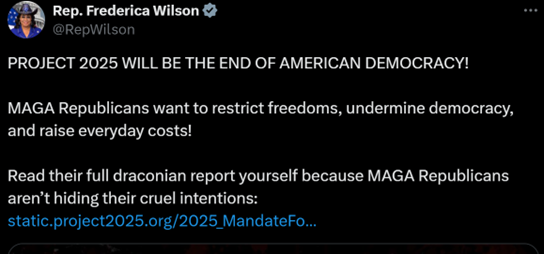
Figure 3: Tweet by Frederica Wilson (D-Fla.) on July 7, 2024
California House candidate Jessica Morse echoed these concerns, describing the project as a roadmap toward a “fascist state driven by an extreme Christian nationalist agenda”. Illinois Representative Sean Casten (D-Ill.) posted a popular thread arguing that Project 2025 is an unpopular and reactionary plan aimed at undermining American democracy, which, despite Trump’s denials, would usher in autocratic tactics used by leaders like Russian President Vladimir Putin and Hungarian Prime Minister Viktor Orbán.
Republicans, by comparison, mentioned Project 2025 in just 176 posts—nearly all those posts tried to distance the project from Trump.
Election Denialism and Voting Rights
Democratic candidates regularly tied the events of January 6 and perceived efforts by some Republicans to cast doubt on past and future US elections as a threat to democracy. This was often presented as a political choice between those who would respect the outcome of elections, those who either refused to certify or cast doubt on the legitimacy of past elections, and/or those who expressed sympathy for those prosecuted for their actions on January 6.
Democratic candidates also tied their defense of democracy to support for voting rights and opposition to Republicans’ voter integrity efforts. Democratic candidates made 485 posts that referenced democracy and “voting rights”, compared to just 31 such posts from Republicans—many of which criticized Democrats for allegedly disenfranchising primary voters or for giving noncitizens the right to vote. Democratic candidates also took on perceived efforts by Republicans to disenfranchise voters or promote the so-called “Big Lie”, as well as threats to election workers and officials.
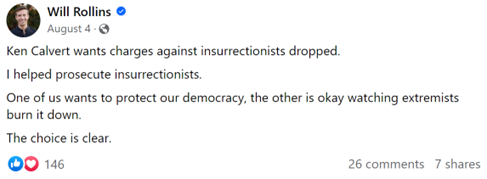
Figure 4: Facebook post made by California Democratic congressional candidate Will Rollins
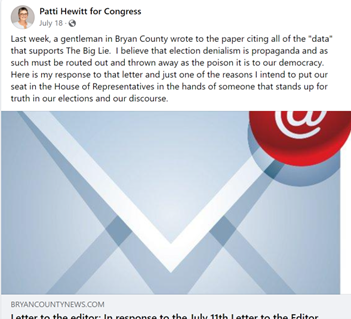
Figure 5: Facebook post from Georgia Democratic congressional candidate Patti Hewitt on July 18, 2024
Defense of Democracy Overseas
Several Democratic posts drew a connection between efforts to defend democracy at home and abroad. Adopting a position more traditionally associated with the GOP, Democratic candidates presented themselves as a bulwark against authoritarian threats overseas, juxtaposing their commitment to defend democracy with the alleged indifference or outright support for authoritarians from Trump or other Republicans. In democracy-related posts, Democratic candidates mentioned US allies Ukraine (108 posts), Israel (18 posts), and Taiwan (13 posts) in 133 posts, with several of those posts warning that a Trump presidency would undermine democracies around the globe. In July, Jerrad Christian, a Democratic House candidate in Ohio, suggested that Republicans and Trump would “weaken democracy” by letting Putin take Ukraine. Jennifer McClellan (D-Va.) also contrasted Biden’s (then the presumptive Democratic nominee) support for NATO with Trump’s willingness to abandon it, making the argument that Biden was a defender of democracy “at home and around the world”.

Figure 6: Tweet from Jerrad Christian, Democratic House candidate from Ohio's 12th District, on July 25, 2024
Democracy and the Democratic Platform
Democratic candidates consistently emphasized the defense of democracy alongside key electoral issues such as reproductive rights, social security, and the legitimacy of the Supreme Court. In Democratic posts referencing democracy, 286 also mentioned “reproductive”, capturing a range of terms related to access to abortion and women’s health. Virginia House candidate Eugene Vindman, for example, directly linked the protection of democracy with safeguarding reproductive rights and social security. Similarly, Representative Ilhan Omar (D-Minn.) listed preserving democracy first among several Democratic campaign priorities, including “reproductive freedom”.
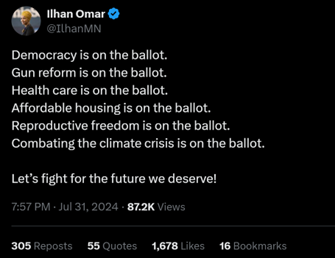
Figure 7: Tweet from Ilhan Omar (D-Minn.) on July 31, 2024
Threats to Democracy According to Republicans
Democrats’ Rhetoric
A prominent theme in Republican messaging was criticism of Democrats for referring to them, or more specifically to Trump, as a threat to democracy. As noted, 23% of Republican posts mentioning “threat” and “democracy” were, in fact, rebuttals. In a seeming response to Democrats’ claims, Arizona Senate candidate Kari Lake posted on multiple social channels that Republicans are not “threats to democracy”, “far-right extremists”, or “domestic terrorists”, but rather “common sense, hard-working patriots”. Representative Anna Paulina (R-Fla.) shared a long Facebook post documenting threats against her, which she blamed on her opponent’s “irresponsible rhetoric”.
This narrative was particularly prominent after both assassination attempts against Trump, which some Republicans blamed on the “Left’s rhetoric”. Representative Dan Crenshaw (R-Texas), for example, took the media and “left-wing politicians” to task for calling Trump a “threat to democracy” and turning the election into “an existential crisis for the soul of America”. The Trump campaign also advanced this argument, criticizing Democrats for continuing to call him a “threat to democracy” even after a second assassination attempt. (This theme is covered in greater detail in the section on “attempted assassinations”.)
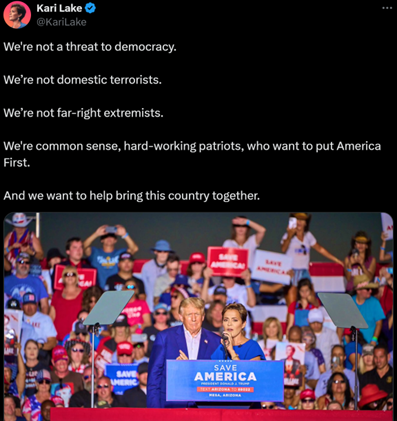
Figure 8: Tweet by Kari Lake on July 14, 2024
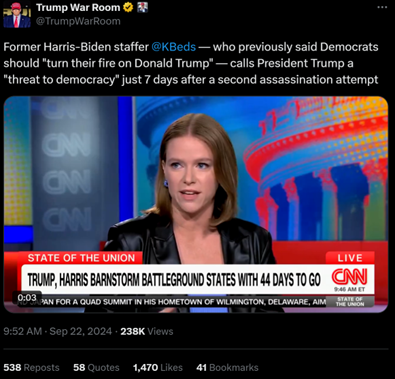
Figure 9: Tweet from the Trump campaign on September 22, 2024
Other candidates attempted to deflect criticism of Trump and/or the Republican party by flipping the script and accusing Democrats of being anti-democratic. Referring to individual Democrats and/or Democratic policies, Republican candidates used the phrase “real threat to Democracy” or “actual threat to democracy” in 43 different posts. In many of those posts, they directly or indirectly called out the perceived hypocrisy of Democrats, or pivoted to highlight issues, like immigration, that they framed as a bigger threat.
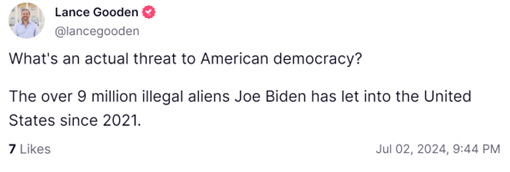
Figure 10: Truth Social post from Representative Lance Gooden (R-Texas) on July 2, 2024
Kamala Harris and Joe Biden
Unlike Democratic candidates’ efforts to cast Donald Trump as a unique threat to democracy, Republican references to Kamala Harris and Joe Biden were often in terms that suggested that it was their party and its policies, not the individuals, that represented a threat to democracy. Republican candidates mentioned Harris or Biden—often referred to in hyphenated terms after Harris became the nominee—in roughly 30% of their posts mentioning “threat” and “democracy”. Though certainly some of these posts specifically attacked Harris’ policies or qualifications as a threat, most were more general and suggested that the threat was not only at the top but across the Democratic ticket.
Republican candidates sharply criticized Biden’s decision to not run for reelection and Harris’ subsequent nomination. Representative Andy Barr (R-Ky.), for example, argued that “invalidating the votes of 14 million Democrat primary voters who chose Joe Biden” was both hypocritical and undemocratic, especially for a party warning about “threats to democracy”.
Representative Marjorie Taylor Greene (R-Ga.) amplified this claim, characterizing Biden’s decision not as a choice but as a coup that aimed to install Harris as the presidential candidate, despite her receiving no primary votes. Eric Hovde, a Senate candidate in Wisconsin, posted on Facebook that Democrats’ “continued ‘threat to democracy’ claim is as insincere as it is dishonest” and that the “left mocked the democratic process by going around voters to anoint an untested and unproven Kamala Harris”.

Figure 11: Tweet from the Trump campaign on September 16, 2024
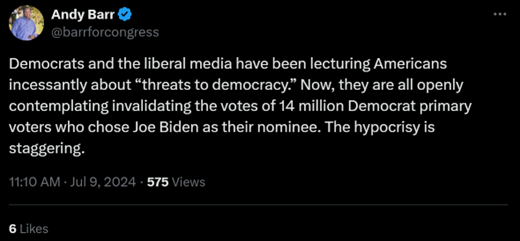
Figure 12: Tweet from Representative Andy Barr (R-Ky.) on July 9, 2024
Immigration and Noncitizen Voting
Roughly 6% of Republican candidate posts mentioning “threat” and “democracy” focused on the Biden administration’s immigration policies and Democrats’ alleged support for allowing noncitizens or “illegal aliens” to vote. On Truth Social, Trump posted that Harris “allowed” millions of people to pour through our Borders, many from prisons, mental institutions and, indeed, terrorists”, arguing that making her a presidential candidate without a primary process was a “Threat to Democracy!”
Pennsylvania House candidate Robert Mercuri also suggested that open borders and allowing non-citizens to vote in elections undermines the democratic process. Similarly, Representative Chip Roy (R-Texas) labelled Democrats “tyrants” for allegedly allowing noncitizens to vote. Several candidates also used this framing to criticize Democrat opposition to the SAVE act, which would require voters to provide proof of citizenship to register to vote. Indiana Senate candidate and current Representative Jim Banks labelled Democrats’ opposition to the SAVE Act as evidence that “Democrats are the REAL threat to Democracy”.
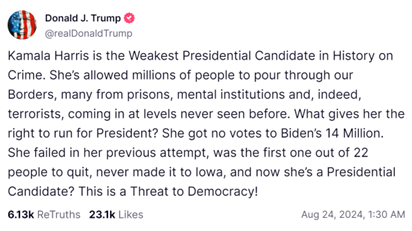
Figure 13: Truth Social post from Donald Trump on August 24, 2024
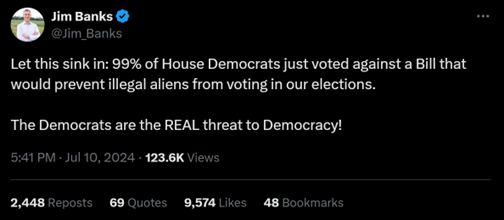
Figure 14: Tweet from Indiana Senate candidate Jim Banks (R-Ind.) on July 10, 2024
Weaponization of the Justice System
Republican candidates framed Trump’s legal battles as a strategic effort by Democrats to suppress political opposition and manipulate democratic institutions. Representative Lance Gooden (R-Texas) asserted that efforts to “put Trump in jail” fit a pattern stretching back to 2016, where he alleged that the “Radical Left” spied on the Trump campaign. Senator Ted Cruz (R-Texas) argued that Trump’s various legal cases, which he categorized as an effort by the US Department of Justice (DOJ) to “target political opponents”, fit a pattern of Democratic overreach.
Beyond criticism of the various investigations into and criminal proceedings against former president Trump, Republicans also framed the DOJ’s prosecution of those involved in January 6 as a “threat to democracy”. Most vocal on this point was Marjorie Taylor-Green (R-Ga.), who slammed Democrats for calling Trump and his supporters “Nazis, deplorables, and ‘threats to democracy’”, while alleging that the Democrats had “weaponized” the DOJ to put “innocent Americans in federal prison for their beliefs”.
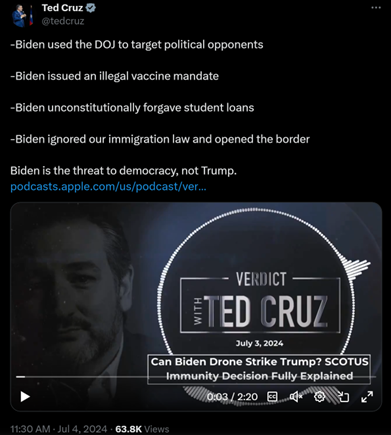
Figure 15: Tweet from Ted Cruz (R-Texas) on July 4, 2024
The Episodic Divide
Pivotal moments in this election season, from the first attempt on Trump’s life to Biden’s decision to drop out of the race, served as pivotal moments that allowed each party to orient those events within their ideological frameworks and align them with their preferred narratives. Democrats, for example, framed the Supreme Court’s decision to grant Trump immunity from criminal liability for official acts as a threat to democratic checks and balances, while Republicans highlighted moments like Biden endorsing Harris as an elite-driven action that undermined voter autonomy and the democratic process. These events provided opportunities to reinforce each party’s broader concerns about democratic integrity, governance, and power structures, thereby shaping public perceptions and discourse.
Supreme Court Ruling
On July 1, 2024, the Supreme Court of the United States issued a landmark decision in Trump v. United States, ruling that a president has presumptive immunity from criminal prosecution for actions taken while exercising “core constitutional powers” of the presidency. In total, Democrats made 192 posts that mentioned “democracy” and the Supreme Court, almost all of which were negative. Concerns about corruption on the Supreme Court were often coupled with criticisms of the court’s decision in the Trump case. Democrats argued that this ruling fundamentally undermined American democracy through the erosion of checks and balances and through the expansion of presidential and judicial powers. Sue Altman, a Democratic nominee for a House seat in New Jersey, argued that the decision elevated the presidency to a near-monarchical status, violating the principles of a government accountable to the people. Representative Pramila Jayapal (D-Wash.), posted on Facebook that the court’s ruling was “a direct threat to our democracy”, and Representative Alexandria Ocasio-Cortez (D-N.Y.) condemned the ruling as part of a broader corruption crisis within the Supreme Court, framing it as an authoritarian overreach.
Republican candidates, conversely, hammered Democrats not only for their criticism of the court but also their proposal to expand the court. In their 45 posts referencing “democracy” and the “Supreme Court”, a common theme was criticism of Democrats for attacking the “integrity of the court”. Representative Dan Crenshaw (R-Texas) was particularly vocal in criticizing Democrats’ plan to expand the court or enact term limits. In several posts, Crenshaw slammed Democrats for trying to “pack the court”, which he framed as an effort by the Biden administration to burn down institutions.
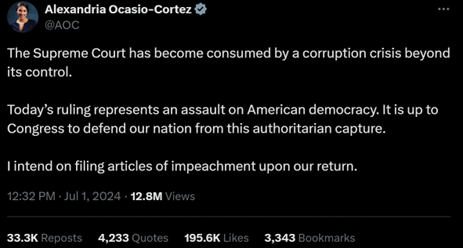
Figure 16: Tweet from Alexandria Ocasio-Cortez (D-N.Y.) on July 1, 2024
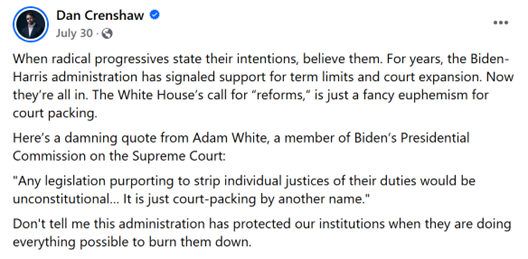
Figure 17: Facebook post from Dan Crenshaw (R-Texas) on July 30, 2024
The Attempted Assassinations
Unsurprisingly, Republican candidates were roughly three times more likely than Democratic candidates to link the two assassination attempts against Trump to democracy. At the same time, Democrats who did post about “democracy” in the context of the assassination attempts were universal in condemning political violence and framing it as antithetical to the principles of democracy. Senate candidate and current Representative Colin Allred (D-Texas) and California House candidate Jessica Morse stressed that violence has no place in our democracy, calling for unity in rejecting such acts. Montana House candidate Monica Tranel reinforced the idea that democracy relies on peaceful methods, such as voting, to express political will, while Representative Andy Kim (D-N.J.) underscored that “we all lose” if political differences are “resolved through weapons rather than ballots”.
While some Republicans, like Representative Aaron Bean (R-Fla.), echoed Democrats’ call for unity and condemnation of political violence, others, such as Representative Wesley Hunt (R-Texas), criticized perceived hypocrisy from Democrats. Hunt questioned the sincerity of those who had harshly criticized Trump only to then condemn the violence against him, while suggesting that their previous rhetoric may have contributed to the attack.
Messaging about the second foiled attempt on Trump’s life mirrored the first on social media, with some Republicans blaming Democrats for inflaming tensions, while Democrats decried political violence broadly as a threat to democracy. On Instagram, Representative Marc Molinaro (R-N.Y.) called the threat to Trump “present, growing, and being made worse by dangerous rhetoric like this”, referring to a screenshot of his opponent, Josh Riley, calling the election a choice between respecting or tearing down democracy. Representative Andrew Clyde (R-Ga.) was more direct, linking Harris’ statements in the presidential debate to the attempted assassination. This was also a common narrative in messaging from the Trump campaign.
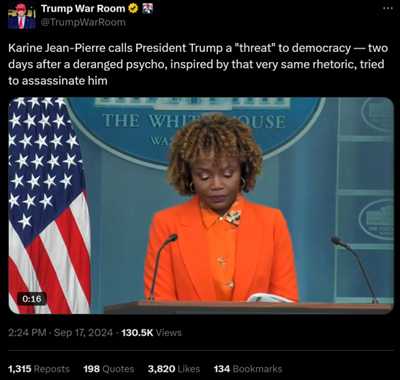
Figure 18: Tweet from the Trump campaign on September 17, 2024
Joe Biden Backs Out and Endorses Kamala Harris
On July 21, President Biden withdrew from the presidential race and endorsed Harris for president. Republican candidates portrayed this decision as an undemocratic and elitist maneuver by the Democratic Party, which allegedly disenfranchised millions of voters who supported Biden in the primaries. Representative Elise Stefanik (R-N.Y.) accused Democratic elites and donors of orchestrating a back-room deal to replace Biden with Harris, arguing that this decision undermines the very principles of democracy by bypassing voters. Representative Greg Steube (R-Fla.) echoed this sentiment, emphasizing that Harris had not been elected by any Democratic primary voters and criticizing the process as a closed-door selection that contradicts the party’s claims of upholding democratic values. Representative Mary Miller (R-Ill.) decried the secretive, elite-driven process of selecting Harris as “an attack on democracy from the self-proclaimed ‘defenders of democracy’”.
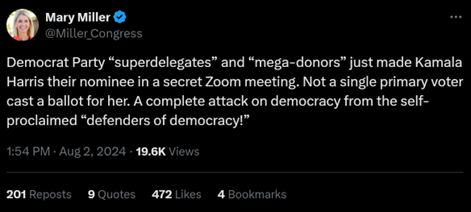
Figure 19: Tweet from Mary Miller (R-Ill.) on August 2, 2024
By contrast, Democratic candidates framed Biden’s decision to cede the Democratic nomination to Harris as a selfless act in defense of democracy. Representative Ro Khanna (D-Calif.) praised Biden for prioritizing the country over personal ambition, positioning him as a leader committed to reversing harmful economic policies and safeguarding American democracy. After Biden officially announced that he would not seek reelection, Representative Andy Kim (D-N.J.) reinforced the idea that defending democracy is a collective responsibility, praising Biden for his decision.
Conclusion
The way candidates talk about threats to democracy is not just a reflection of ideological divides—but also how Americans feel about one another. On that front, the data is concerning. Overwhelmingly, candidates from both parties are far more likely to refer to the other party and its candidates as threats to democracy than antidemocratic forces abroad, including those that are actively interfering in the US political process. At a time when authoritarianism is on the rise around the globe, it is telling that our political discourse about democracy is inward rather than outward-looking.
Our findings also reveal that while Republican and Democratic candidates were often galvanized by the same events to discuss democracy, their interpretations were often—though not always—at odds with one another. This might suggest that the differences between the parties are irreconcilable. But there were, in fact, commonalities that suggest more common ground. Candidates from both parties, for example, were deeply concerned about the rule of law. For Democrats, that was expressed through concerns about the spate of recent rulings from the Supreme Court and allegations of corruption on the court. For Republicans, that concern was expressed through concerns about the alleged “weaponization” of the DOJ and perceptions that the legal cases against Trump were driven by political motivations. Candidates from both parties also were aligned in the need to protect the sanctity of the vote. Again, this latter point was expressed differently: for Democrats, it was about protecting voting rights; for Republicans, it was about election security and integrity. Finally, and perhaps most hopefully, candidates of both political stripes were universal in their rejection of political violence—even if some Republicans blamed Democrats for stoking that violence.
This study makes clear that when Democrats and Republicans talk about threats to democracy, there are both ideological divides and common understandings. Yet beneath the competing narratives and accusations there is also a common thread: a desire to preserve a system that feels increasingly fragile.
1 Kamala Harris was included as the Democratic candidate for president despite the fact that she was not the presumptive nominee during the first month of our study.
Annika Sharp and James Conway made significant research contributions to this report.
The views expressed in GMF publications and commentary are the views of the author alone.

